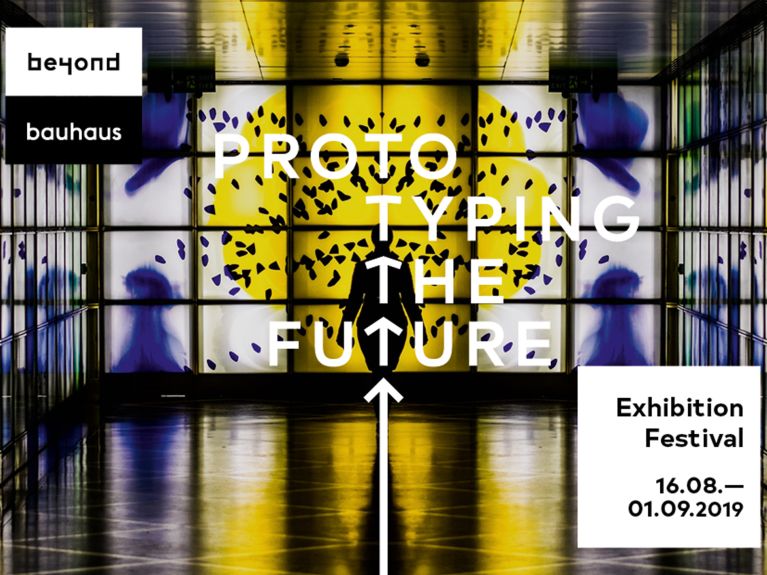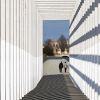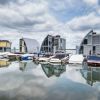For a better future
Nearly 1.500 applicants from 50 countries took part in the competition „beyond bauhaus - prototyping the future“. We present three of the winners.

With „beyond bauhaus - prototyping the future“, the initiative „Germany -Land of Ideas“ sought forward-looking design concepts against the backdrop of the centennial anniversary of the Bauhaus. The concepts were to address relevant social issues and contribute to making the world a fairer, more sustainable and better place.
Nanocellulose Desert Shelter
In the Israeli Negev desert, a building is being constructed from nanocellulose, a sustainable building material made from recycled natural fibres. The novel biomaterial nanocellulose is a recent focus of both science and industry. The potential applications of natural fibres range from fabricated materials to medical technology food and pharmaceuticals. The Israeli architecture firm NCA Architects with Dr. Guy Austern investigates the potential of nanocellulose for building construction, based on the scientific work of Prof. O. Shosayov.
With their project "Nanocellulose Desert Shelter", they have designed an educational and cultural centre for the Bedouin community in the Negev desert made entirely of recycled natural fibres, from supporting structures to insulations and windows. The architects attach great importance not only to the recyclable, environmentally friendly building material, but also to a design that blends harmoniously into the desert environment and honours the tradition of Bedouin culture. Inspired by the organic shape of the dune, these architectural modules are a modern interpretation of a traditional Bedouin dwelling, using the latest technology.
Dieses YouTube-Video kann in einem neuen Tab abgespielt werden
YouTube öffnenThird party content
We use YouTube to embed content that may collect data about your activity. Please review the details and accept the service to see this content.
Open consent formJajja's House: A house that strengthens women in Africa
Making a fire, cooking, doing laundry. Although housework like this is traditionally done by women in the Ugandan village of Kikajjo, their domestic environment is planned and built by men. Students at Presbiteriana Mackenzie University in Brazil want to change this, by enabling women to design their homes according to their needs. During a several-months stay, students and the 75-year-old Jajja Imaculate developed the project "Jajja´s House".
Here is a dwelling that considers local resources and traditional building methods as well as the needs and perspectives of the inhabitant. From the first drawings to the construction, Jajja and other local women were involved in the workshops. Together they conceived, for example, a central kitchen that can be separated from the living space with movable panels. The roof was constructed so that its supporting columns can collect water. The jointly planned house will now become Jajja's new home and can also serve as a model and inspiration for other buildings in Kikajjo—and throughout Africa.
Dieses YouTube-Video kann in einem neuen Tab abgespielt werden
YouTube öffnenThird party content
We use YouTube to embed content that may collect data about your activity. Please review the details and accept the service to see this content.
Open consent formSoft-Urb: the city as a garden for everyone
According to United Nations statistics, more than two-thirds of the world's population will live in cities by 2050. It is therefore essential to create future urban spaces that are sustainable, ecologically resilient and worth living in. This is the goal of the open-source project "Soft-urb", comprised of two award-winning initiatives, "Make the Streets Green Again" and "Take a Grow".
The initiators are not interested in radically redesigning cities; rather, they aim to put into motion a multi-layered, multi-dimensional process that prepares society for the ecological, economic and social challenges ahead. They want to work with citizens to develop, test, and adapt solutions. "Soft-urb" spans physical and virtual interfaces, using mobile apps, place-making and tactical urbanism to unleash the sustainable, creative potential of cities and to transform urban living space into an environmentally friendly organism.
From 16 August to 1 September 2019, the award winners will present their projects in an exhibition at Aufbau Haus Berlin, Germany.
„beyond bauhaus – prototyping the future“: All 20 award winners




